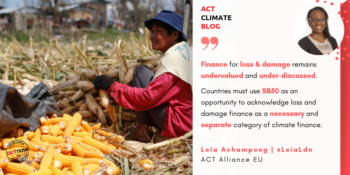In the last few years, we have experienced an increase in extreme climatic events across the globe. Increased droughts, severe storms and unprecedented flooding, from the Americas through to the Pacific have brought loss and damage (climate impacts that cannot be adapted to) to the forefront of developed and developing country agendas.
Climate change is severely impacting the livelihoods of local communities. Biodiversity loss and increased economic instability within and amongst regions has forced citizens to migrate from rural to urban areas, and this, in turn, is placing pressure on available urban resources.
Countries need to take action to temper these successive impacts. This is particularly the case as climate impacts are not localised. For example, a flood in Sub-Saharan Africa that wipes out crops and washes away layers of topsoil could impact the global food trade and food flows. This could result in price spikes for staple foods such as grain, milk, rice, etc., which could lead to food insecurity.
Similarly, a drought in Western Asia could have significant repercussions for the populations there. Severe droughts could prevent new grains from flourishing which could reverse the gains made in combatting malnutrition.
Despite the understanding of such threats, climate finance for loss and damage remains undervalued and under-discussed.
During this UNFCCC inter-sessional (SB50), countries will discuss the new terms of reference for the Warsaw International Mechanism on Loss and Damage. Such a discussion must be broader than a reflection on the current state of play and must look at what must happen for the needs of those impacted by loss and damage to be adequately addressed. This discussion must explore how to operationalise the Warsaw International Mechanism on Loss and Damage, and parties must agree on options for creating a specific finance stream for loss and damage as existing climate finance options tend to be geared towards mitigation.
Countries must use SB50 as an opportunity to acknowledge loss and damage finance as a necessary and separate category of climate finance. Doing so will create the foundation for a new stream of finance that is necessary to address the effects of climate change and to enable forecast based finance (finance that is issued to developing countries before a climatic event occurs, based on forewarning) and support for slow on-set disasters.
Climate finance for loss and damage should be new and additional to the existing commitments for development and humanitarian aid. It should prioritise the needs of vulnerable members of society and those in most need of support.
Possible sources of finance for loss and damage that could be explored include a tax on aviation or on shipping- two industries whose existing ‘measures’ do not live up to the urgency to tackle climate change. Another potential flow could come in the form of a climate damages tax. The reality is that various options exist and their potential must be explored before the climate emergency escalates further.
 Blog by Leia Achampong, Climate Justice Policy Officer at ACT Alliance EU
Blog by Leia Achampong, Climate Justice Policy Officer at ACT Alliance EU